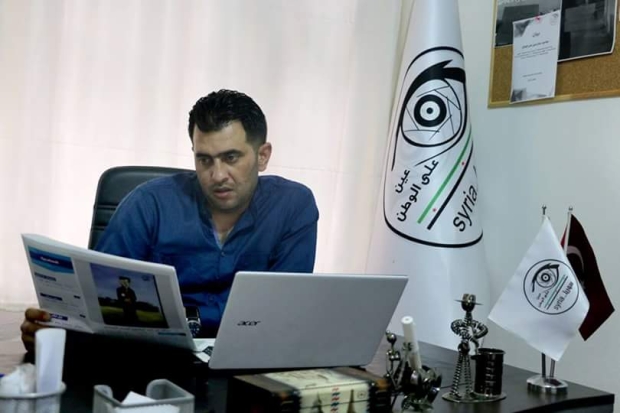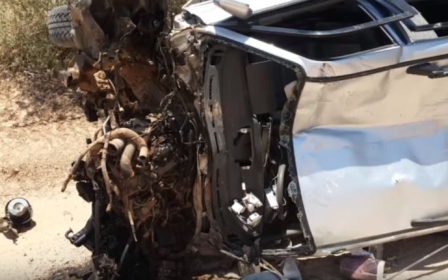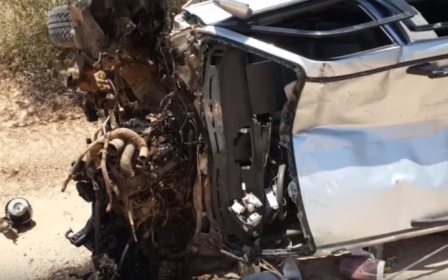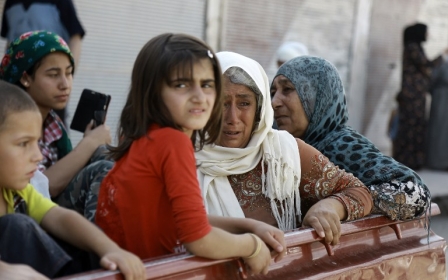Syrian journalist gunned down by IS: 'None of this will stop me'
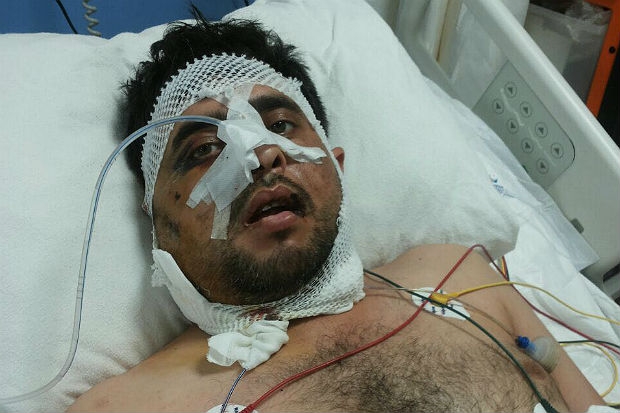
ISTANBUL, Turkey – When Ahmed Abdul Qadir went under the surgeon’s knife for the second time in a year earlier this month, he was determined to hang on – if only to spite what is currently considered the world’s most barbaric group.
Abdul Qadir was gunned down this March in the southeastern Turkish city of Sanliurfa by members of the Islamic State (IS) group. The three bullets lodged in his body were removed, but medical complications meant he required further surgery.
“Being attacked, seeing my brother and colleague killed. None of this is going to stop me,” Abdul Qadir told Middle East Eye. “I will keep writing the truth about Daesh (another acronym for IS). I don’t regret becoming a journalist.”
IS had already killed his brother Ibrahim and his colleague, Fares Hamadi, in an attack last October.
Abdul Qadir first came into IS’s crosshairs in 2013 when the group took control of the Syrian city of Raqqa, where Abdul Qader lived. A construction engineer with no links at all to journalism, he and his family started receiving threats after he began criticising their actions locally.
It was such threatening behaviour that led Abdul Qadir and his colleagues to become what IS really hates: journalists.
After fleeing to Turkey, Abdul Qadir, his brother, and colleagues were determined to inform their people, and the world, of the atrocities being committed in their war-ravaged country by both IS and forces loyal to Syrian President Bashar al-Assad.
Abdul Qadir set up and runs a news portal called Eye on Homeland, which mainly provides news reports in Arabic about events unfolding inside Syria.
“I fled to Turkey and decided to create the Eye on Homeland news site. Someone had to inform the world about IS barbarities. I took it upon myself to do it,” said Abdul Qadir.
But IS takes a very dim view of independent media and the free flow of information, and Abdul Qadir and his colleagues started receiving constant threats.
Eye on Homeland currently has nine staff members. Six of them are in various locations in Syria, and three are based in Sanliurfa. Of the six inside Syria, two are professional journalists and the other four are citizen journalists.
Abdul Qadir was unwilling to reveal the locations of his six colleagues in Syria, fearing for their safety.
He says the project is independently financed and he receives no support from any group or state.
Supporters everywhere
Of the various attacks carried out in Turkey attributed to IS, such as this month’s bombing at Istanbul’s main airport that killed 45 people, it is only the attacks on Syrian journalists that IS has officially claimed responsibility for.
Different theories have been put forward for the reason behind this, and one of the more prominent ones is that IS does not want to be seen as the instigator of mass attacks against Muslims.
For all its barbarity and crudeness, IS understands the power of media and the importance of public image. And therefore appears determined to attack journalists.
According to Abdul Qadir, the fear of having their misdeeds reported to the people they rule over in their own language poses too large a threat for IS. He says the group also has a large enough presence in Turkey to carry out such attacks against journalists with impunity.
“Daesh [IS] has many members and supporters in Turkey. They can be found everywhere in every section of society,” said Abdul Qadir.
He does not believe that IS has state support in Turkey but at the same time is surprised at the lack of additional police security measures for himself and his co-workers in the wake of the killing of his brother and colleague.
“The Turkish police did not take any additional security measures after the two killings last year and the attack on me. I don’t know the reason behind it and why that is the case,” he said.
However, he also believes that if IS was receiving Turkish state support it would not target Turkey as it has done.
“They [IS] attack Turkey just like they attack Paris, Brussels and other places. I believe they don’t receive support from the Turkish state.”
During the early years of the Syrian conflict, Turkey faced strong allegations of tolerating IS and turning a blind eye as the group used Turkish territory to transfer fighters to and from Syria among other things.
It was alleged that Ankara initially saw IS as a useful tool to eject Assad from power and then to contain the expanding Kurdish Democratic Union Party (PDK)-led presence in northern Syria along Turkey’s border.
Ankara’s initial low-key response when the mainly Kurdish-populated town of Kobane fell to IS in 2014 was used to justify the claim that Turkey saw the left-leaning Kurds in Syria as a greater threat than IS.
Turkey refuted these allegations right from the start, saying it was one of the first countries to put IS on its list of terrorist organisations in 2013.
With the increase of IS attacks on Turkish soil in the last year, Turkey has taken more high-visibility steps against alleged IS members. They include multiple police raids, the creation and implementation of an expansive no entry list, and the shelling of IS positions close to the Turkish border.
Permitting the use of the Turkish Incirlik air base in July last year for coalition strikes against IS is considered one of the reasons why IS started targeting Turkey directly.
What started as a mission to inform the world and Syrians in particular about IS atrocities – the group still tries to distribute a biweekly newsletter as widely as possible within Syria – the Eye on Homeland project has also evolved into a personal quest for Abdul Qadir, a father of two, after the killing of his brother and the constant threats to himself, his family and his colleagues.
Abdul Qadir insists that he will not shy away from being a journalist as long as he feels he is needed, if only for the sake of his two children whom he wishes to grow up in a free environment.
“If the war ends and my country is rid of both IS and Assad, I will have a decision to make. It depends on what conditions will be like. If we have a free and independent media, there will be no more need for people like me and I will return to my original occupation.”
New MEE newsletter: Jerusalem Dispatch
Sign up to get the latest insights and analysis on Israel-Palestine, alongside Turkey Unpacked and other MEE newsletters
Middle East Eye delivers independent and unrivalled coverage and analysis of the Middle East, North Africa and beyond. To learn more about republishing this content and the associated fees, please fill out this form. More about MEE can be found here.


